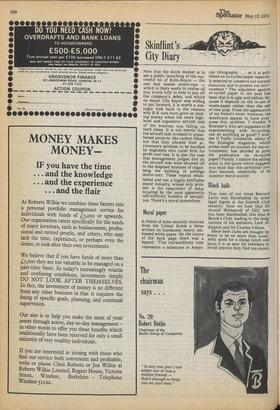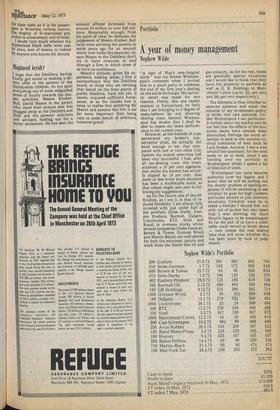• Skinflint's City Diary
Now that the stock market is to see a public launching of the successful bit of Rolls-Royce — the one that makes motor-cars — which is likely easily to realise all that lovely lolly to help to pay off the company's debts, and which no major City buyer was willing to put forward, it is worth a nostalgic look back to the reasons why R-R cars have gone on making money when the more highlevel and expensive aircraft side of the business was falling on hard times. It is not merely that the aircraft side invested in unperfected projects, like carbon fibres; nor that they allowed their accountancy problem to be handled by engineers who cared little for profit and loss. It is also the case that management judged dud on the aircraft side were shunted off to the despised business of organising the building of prestige motor-cars. These rejects established and ran a highly profitable motor industry, whose only problem is the repayment of debts incurred by the once apparently Eelf-sufficent builders of aeroplanes. There's a moral somewhere.
Moral paper
A friend of mine recently received from the United States a letter written on handsome, heavy, embossed white paper. On the centre of the back page there was a legend, "This extraordinary note represents a milestone in Ameri
can lithography . . . as it is published on re-cycled paper especial ly selected to conserve our natural resources and to protect our environment." The argument against re-cycled paper in the past has been that it is ugly and yellow, because it depends on the re-use of waste-paper rather than the use of new pulp. From the appearance of my friend's letter, however, the Americans appear to have overcome that problem. I wonder it Bowater's, who are supposed to be experimenting with re-cycling. can do anything as good? I wonder if Teddy Goldsmith, editor of the Ecologist magazine, which prides itself on concern for the environment, has decided to print his publication on re-cycled paper? Finally, I admire the selling point in the quote which suggests you must buy this particular product because, essentially, of its superior moral quality.
Black balls
That man of our times Bernard Levin was blackballed by some legal bigots at the Garrick Club recently. Now we hear that Sir Arnold Weinstock of GEC has, too, been blackballed, this time at Brook's Club, leading to the resignations of his sponsors, Lord Aldington and Sir Charles Villiers.
Since both clubs are thought by many to be no more than worliaday spots for a cheap lunch and since it is as easy for members to avoid anyone they find too exotic for their taste as it is for passengers in Waterloo railway station, the display of ill-mannered prejudice is unnecessary and ill-bred. I doubt very much whether the Mysterious black balls were cast by Jews, men of means, or indeed by anyone who knows Sir Arnold.
Misplaced loyalty
I. hope that the Distillers, having finally got round to making a decent offer to the parents of the thalidomide children, do not spoil everything out of some misguided sense of loyalty towards the chosen solicitors, Messrs Kimber, Bull. David Mason is the parent Who, more than anyone else, has Plugged away at the Distillers and their and the parents' solicitors and advisers, holding out for a better settlement. He has seen the amount offered increased from around £3 million to over e20 millions. Reasonably enough, from his point of view, he distrusts the judgement of Messrs Kimber, Bull (who were advising the parents to settle years ago for an amount which now looks like peanuts); so, says Mason to the Distillers, don't try to force everyone to dear through a firm in which some of us have no confidence. .
Mason's attitude, given his experience, making sense., I find it extraordinary that the Distillers board, or those who are advising that board on the finer points of public relations, have not yet, it seems, acquired sufficient horsesense, or as the Greeks had it, nous, to realise that satisfying Mr Mason and parents like him is far far more important than being nice to some bunch of solicitors, however grand.



































 Previous page
Previous page